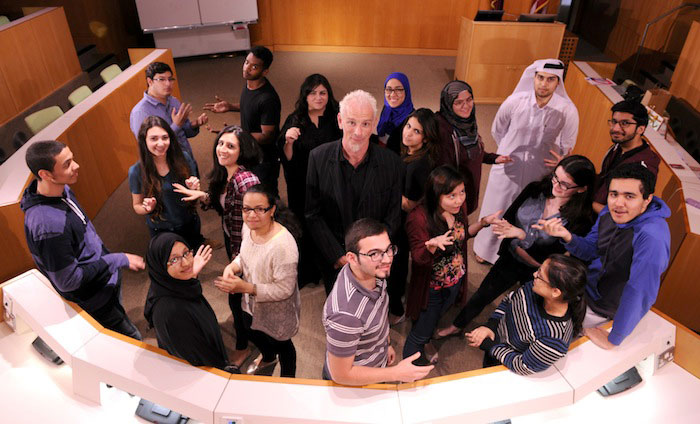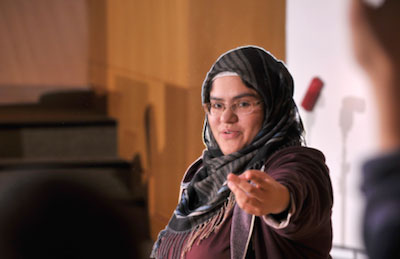WCMC-Q Debate Club prepares for last-gasp title charge
February, 2015

Dr. Sharkey with the WCMC-Q team, which is currently lying in joint second place in the Qatar Universities Debate League.
For many people, the prospect of speaking before an audience is liable to bring them out in a cold sweat.
But for members of WCMC-Q’s Debate Club, the fear they once felt when taking the lectern has been replaced by a sense of relish for the chance to pit their wits against their peers from rival colleges.
Several members of the team, which is currently lying second to Carnegie Mellon in the Qatar Universities Debate League, have recently returned from a trip to the World Universities Debating Championship in Malaysia, where they had the chance to fine-tune their skills in competition with some of the most talented young debaters on the international scene.
It is an experience Dr. Rodney Sharkey, associate professor of English and WCMC-Q’s debate club coach, hopes will give the team the edge in the domestic league’s final debate on February 28 when they will attempt to snatch the top spot from CMU-Q in what promises to be a thrilling and fiercely contested dénouement to the season. When the league has concluded, the WCMC-Q team will take part in the one-day National Championship contest that will take place on a date yet to be announced, most likely in late March.

Syeda Haider makes a point during a debate.
Dr. Sharkey, who accompanied the team to Malaysia, said: “It’s an exciting time in the annual debate league calendar just now in Qatar. The big double of league title and then the national cup is still up for grabs. As WCMC-Q has a chance to win both trophies it brings real momentum to the close of the season. And, as always, we’ve blooded in a host of new pre-medical students as novice debaters this year to ensure that we remain the biggest and best.”
The WCMC-Q debaters will also need to be wary of a challenge from a strong Georgetown team, with the two sides tied for second place in the league going into the final debate.
The league, run by Qatar Debate, is contested over four tournament events held throughout the academic year by teams from WCMC-Q, Texas A&M University at Qatar, Georgetown School of Foreign Service, Carnegie Mellon University in Qatar, College of the North Atlantic – Qatar, Stenden University Qatar and Qatar University. WCMC-Q boasts the largest debate club in Qatar and has members in classes from Pre-medical 1 to Medical 4.
All university debates in Qatar are conducted according to the British Parliamentary format, which pits four two-member teams against one another in a battle of wits, rhetoric and speed of thought as they argue either for or against a motion put before them. Two teams argue for the motion and two against, so in order to win a debate a team must not only outperform the teams arguing the opposite side of the motion, but must do so more convincingly than the team arguing the same side.
It is a form of competition that Med 1 student Mountasir El-Tohami, president of the WCMC-Q Debate Club, finds rewarding both for its own sake and for the transferable skills it helps him to develop.
He said: “I had always shied away from public speaking as I saw it as something intimidating. When my high school mentor asked me to join the debate club, I hesitated at first but after some contemplation I took a leap of faith.
“Four years later, I'm the president of the Debate Club at WCMC-Q. Debate has helped me in multitude of ways but, most importantly, it has given me confidence in being myself. Through speaking publicly, being critiqued, learning to work in a team, overcoming losses and celebrating wins, I have become more comfortable with my own voice and with sharing ideas that I might have refrained from sharing before.
“I think debating is key in education. Everyday we debate with each other on some level. Some people think debating is a conflict, and it can be, but really debating is structured communication. This structure helps us share ideas in an effective manner. Whether it be with your boss, your friend, or your patient, structured communication is key.”
WCMC-Q has been a driving force behind efforts to establish a vibrant debating scene in Qatar. In January, three WCMC-Q students took part in a public debate held at Mathaf Museum where the motion was “This house believes that artists should respect the limits of what is socially and culturally acceptable.” In December 2014, the Debate Club held a public debate to critically examine the ongoing curriculum reform at WCMC-Q in the first of what is intended to be a series of public “Red Debates”. A Red Debate of teaching assistants versus students, which is certain to be hotly contested, is in the pipeline.
Dr. Sharkey added: “Debate is a no-brainer. It develops critical thinking skills, fosters team spirit, improves public speaking abilities and educates students to the wider world. There are many things these students will forget about their time in college, but if they win in the next few weeks, they will remember it forever.”
